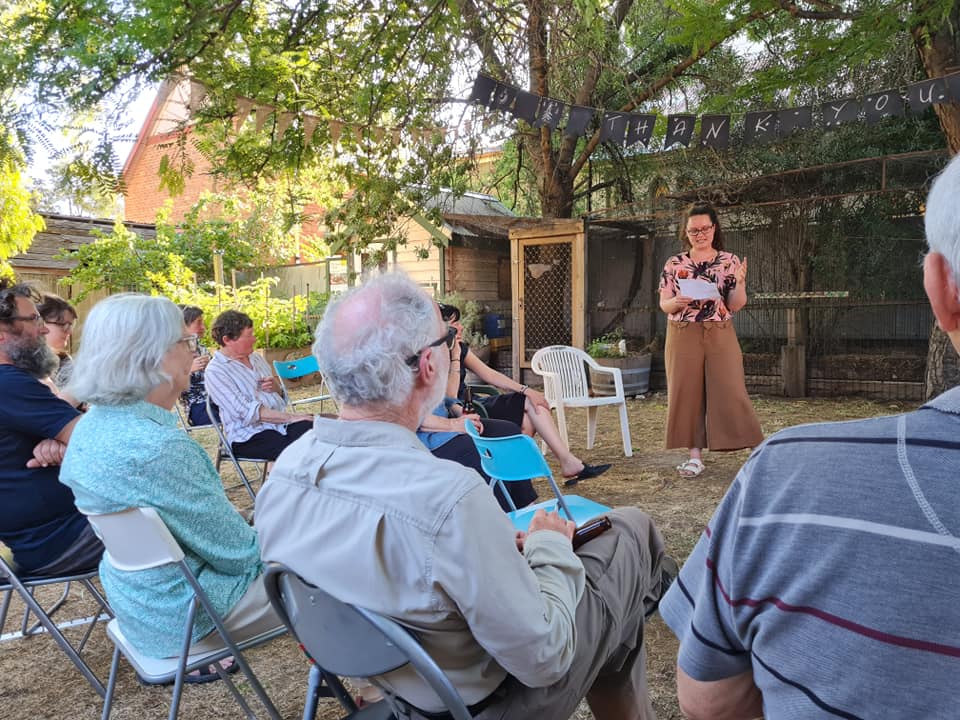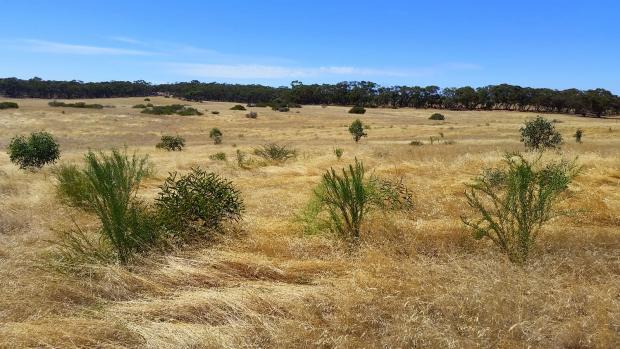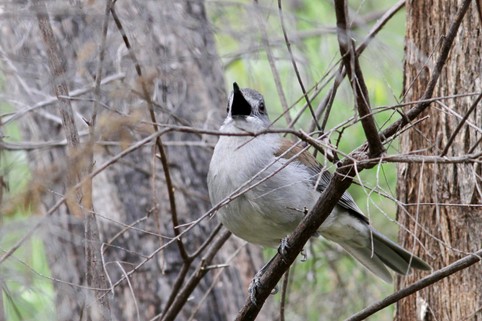Celebrating our volunteer heroes at Connecting Country
Posted on 17 December, 2020 by Ivan
Connecting Country could not do what we do without our volunteers. Our management committee is run by volunteers, our monitoring programs rely on skilled citizen scientists, our landholders ensure landscape restoration is maintained, and others help with events, Landcare, engagement and in countless other ways. We love our volunteers and appreciate their dedication to our vision of increasing, enhancing, and restoring biodiversity across central Victoria.
This year, we were fortunate to receive a very generous donation from a local family to support our woodland bird monitoring, including providing a humble thank-you celebration for our volunteers on the evening of Monday 14 December 2020 at The Hub Plot, behind our office in Castlemaine, Victoria.
We enjoyed COVID-safe celebratory drinks and snack packs in the leafy Hub Plot garden. Our Monitoring Coordinator, Jess Lawton, provided a short summary of our monitoring achievements over the last year, followed by plenty of chatting and Connecting Country’s second annual ‘Klop’ game championship. Thank you to everyone who came and made it a wonderful evening with great company. Special thanks to Lou, Jane R, and Duncan for setting up and helping the evening run smoothly, and to Heather and Neil for the lovely venue.
These days our projects run off very tight budgets, with funding opportunities extremely few and far between. Community has always been at the core of what we do at Connecting Country. In this new phase, we’ve had to rely on our community even more.
Because we’re surrounded by an engaged and enthusiastic community, we’re still able to check in on our local biodiversity, and deliver monitoring, engagement, Landcare support and landscape restoration across our region. If it wasn’t for your hard work, we simply would not be able to continue our valuable long-term biodiversity monitoring, engage our community in caring for our local landscapes, or empower landowners to manage their land as wildlife habitat.
To everyone who has helped Connecting Country in 2020: a big thank you! We are so grateful for your support.
To find out more about volunteer opportunities at Connecting Country, please visit our website – click here
Please enjoy the following photos by Lou Citroen and Ivan Carter, capturing the beauty of our volunteer celebration on a balmy summer’s evening in Castlemaine.
Festive greetings 2020
Posted on 17 December, 2020 by Frances
On behalf of the Connecting Country team, we wish every one of you the very best over the festive season, with special greetings to our wonderful volunteers, members, landholders, donors and supporters.
Whichever way you choose to celebrate, we hope you enjoy a well-deserved rest, and take time to connect with loved ones and our special local environment.
Connecting Country’s physical office at the Hub in Castlemaine remains closed to the public, in line with government health guidelines. Our virtual office will also close from 24 December 2020 to 4 January 2021 while our hardworking staff take a short break.
We look forward to seeing you (hopefully in person) in 2021!
People power! Victoria Gully Group working bee
Posted on 14 December, 2020 by Asha
People power! Earlier this month, twelve Victoria Gully Group volunteers hand-pulled over 2,500 Cape Broom (Genista monspessulana) seedlings at Clinkers Hill Bushland Reserve near Castlemaine in central Victoria. Several years ago, Victoria Gully Group began major restoration work at this site, so this working bee was important follow-up on past work.
Cape Broom is a noxious weed that has damaging impacts on the environment and agriculture in Australia. For more information about its impacts and management – click here and here.
When removing the Cape Broom seedlings, volunteers could see native seedlings emerging, including acacias, native peas and bursaria. If left unchecked, the Cape Broom would quickly grow to out-compete and smother the diversity of native habitat plants growing at the site. As many Connecting Country followers will know, Sweet Bursaria (Bursaria spinosa) is a vital plant for the life cycle of the threatened Eltham Copper Butterfly (Paralucia pyrodiscus lucida). For more information about their unique relationship – click here
Victoria Gully Group volunteers also work with the Department of Environment, Land, Water, and Planning to do restoration work such as revegetation, weed control and exclusion fencing just down the road from Clinkers Hill in Victoria Gully (a tributary for the local Forest Creek in Castlemaine). In recent years they have also established and maintained frog ponds in the gully to provide habitat.
Landcarers are often a humble bunch, so the amazing volunteer work they do can fly under the radar. Victoria Gully Group’s recent working bee was just one example of over 100 Landcare and Friends group working bees that take place in the Mount Alexander region every year to care for our local environment. Let us acknowledge and celebrate this achievement.
If you’d like to volunteer with Victoria Gully Group, or one of our other local Landcare or Friends groups in the Mount Alexander region, you can find their contact details on Connecting Country’s website – click here
2021 Woodland bird calendars – available now!
Posted on 10 December, 2020 by Frances
Treat yourself or your loved-ones to a delightful Christmas gift, while supporting habitat restoration in the Mount Alexander region of central Victoria.
Connecting Country’s 2021 woodland bird calendar is high-quality full-colour, A3-size and spiral-bound. Each month features one of the 13 beautiful images that won our woodland birds photography competition. All photos showcase local bird species and were taken by talented local photographers in the Mount Alexander region of Central Victoria.
Calendars are $30 each and make an excellent gift.
Where to buy:
Mount Alexander Animal Welfare Opportunity Shop
12 Johnstone St, Castlemaine VIC
Shop opening hours:

- Tuesday 10 am – 3 pm
- Thursday 10 am – 3 pm
- Friday 10 am – 3 pm
- Saturday 10 am – 1 pm
For more information on the MAAW shop – click here
For more information on MAAW’s work – click here
Connecting Country again extends a special thank you to our talented volunteer graphic designer, Jane Satchell, and our 13 winning photographers, who generously donated their images to feature in the calendar. Many thanks also to MAAW op shop for their support in stocking our calendar.
Before and after the 2019-20 fires: ALA data showcase
Posted on 10 December, 2020 by Jacqui
The Atlas of Living Australia (ALA) is a collaborative, shared, digital infrastructure that pulls together Australian biodiversity data from multiple sources, making it accessible and usable. Connecting Country’s biodiversity monitoring programs deliver data to the ALA, via the Victorian Biodiversity Atlas (VBA). We use the ALA to keep and identify records of key native species in our region. The ALA helps create a detailed picture of Australia’s biodiversity for scientists, policy makers, environmental planners, land managers, industry and the general public.
The ALA has been busy building an impressive national dataset for all areas of Australia affected by the 2019-20 bushfire season. This dataset is now accessible. You can use the ALA to search for animal and plant species that may have been affected by the 2019-20 bushfires by mapping occurrence records logged in those areas, both before and after the fires.
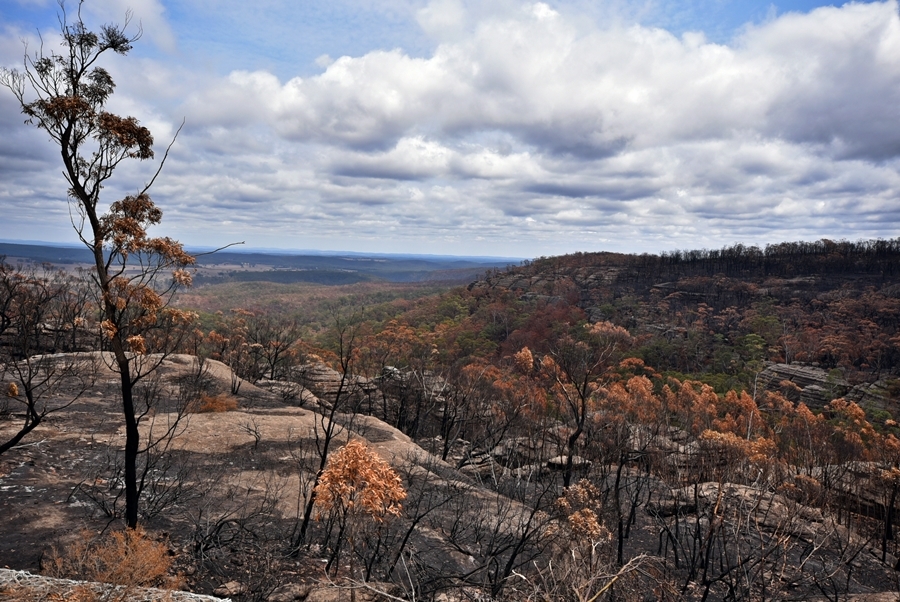
The 2019-20 bushfires were some of the largest and most intense in living memory (photo: University of New South Wales Environment Recovery Project)
We have provided the following overview of this dataset, courtesy of the ALA website.
For ALA’s fact sheet on how to use the dataset – click here
To access the data via an interactive map – click here
How to use the bushfire extent data in the ALA
For more information on how to use this data in the ALA, read our help article on Using the National Indicative Aggregated Fire Extent Dataset 2019-20 in the ALA – click here
The National Indicative Aggregated Fire Extent Dataset
The National Indicative Aggregated Fire Extent Dataset was developed by the Australian Department of Agriculture, Water and the Environment (DAWE) to help quantify the potential impacts of the 2019-20 bushfires on wildlife, plants and ecological communities, and identify appropriate response and recovery actions.
The dataset is a reliable, agreed, fit-for-purpose and repeatable national dataset of burnt areas across Australia for the 2019-20 bushfire season.
The National Indicative Aggregated Fire Extent Dataset includes:
- Data from the national Emergency Management Spatial Information Network Australia (EMSINA) data service, which is the official fire extent currently used by the Australian Government, and
- Supplementary data from other sources to form a cumulative national view of fire extent from 1 July 2019 to the 21 April 2020, these sources include NSW Rural Fire Service, Northern Australian Fire Information (NAFI), QLD Fire and Emergency Service, QLD Department of Environment and Science, SA Country Fire Service, SA Department for Environment and Water, Tasmanian Fire Service, TAS Department of Primary Industry, Parks, Water and Environment, VIC Department of Environment, Land, Water and Planning, WA Department of Biodiversity, Conservation and Attractions.
The dataset is released on behalf of the Australian Government and endorsed by the National Burnt Area Dataset Working Group, convened by the National Bushfire Recovery Agency.
More information and links
- For more details about the dataset visit National Indicative Aggregated Fire Extent Dataset
- For help accessing and using the dataset in the ALA, please email support@ala.org.au
Lizards loving warmer weather
Posted on 10 December, 2020 by Frances
If you think Australia has a national language, consider this lizard. Victorians commonly call it the stumpy-tail or shingleback. However it’s also known as the sleepy lizard (South Australia), bobtail (Western Australia), blue-tongue, bogeye, two-headed lizard and pinecone lizard. Naturally there are also Indigenous names such as Yoorn in the Nyungar language of south-west Western Australia. Some herpetologists (reptile scientists) claim this species has more common names than any other lizard!
Tiliqua rugosa is a short-tailed, slow-moving species of blue-tongued skink found across the arid to semiarid regions of southern and western Australia, including here in central Victoria. Its heavily armoured body can display various colours and patterns, ranging from dark brown to cream. It has a short, wide, stumpy tail that resembles its head, which may confuse predators. The tail also contains fat reserves, which it can draw on during lean times. This big skink is omnivorous. It eats snails and plants, spending much of its time browsing through vegetation for food. It is often seen sunning on roadsides, rocks or paved areas.
There are four subspecies. Tiliqua rugosa asper is the subspecies we find in central Victoria. They pair for life and over the course of their long life (20-30 years), a couple will annually come together to mate and rear their young.
With the weather warming up, you may notice the odd stumpy-tail lizard or other reptile in your neighbourhood. The Australian Broadcasting Commission (ABC) recently published an excellent article describing some practical things you can do to help them:
To read the ABC article – click here
North Central CMA seeking local landholders for carbon projects
Posted on 10 December, 2020 by Ivan
We received a request from the North Central CMA, seeking landholders across our region who are interested in supporting large-scale carbon projects on their properties. Please read on for more information. To view the original article published in the North Central Chat newsletter – click here
Expression of Interest – Carbon landholder register in the north central region
The North Central CMA is actively looking to support large scale carbon projects across our catchment as we recognise the potential contribution of the carbon market to support our Regional Catchment Strategy (RCS) objectives, such as climate change mitigation, retention and protection of on farm biodiversity, biodiversity links, stewardship and increasing soil health.
It is our intention to set up an interested landholder register to allow us to facilitate and enable large scale projects with our NRM partners in the region. We would like to hear from any landholders that would be interested in participating in the carbon market – soil or revegetation. As a guide we have provided the following criteria, but we encourage anyone with an interest to register their details with us as opportunities may exist for smaller sites. Keep in mind that a longer-term commitment would be required on these projects.
Criteria for land:
- The preference would be for 50 hectares or more but 20+ hectares would be acceptable OR
- Long stretch of riparian zones
- Ideally area should provide opportunity for biodiversity, biolinks and indigenous outcomes
- Looking for ecosystems that hold carbon
Once we have an established list of interested landholders, we will be in contact in early 2021 with next steps. We will not share any personal information without your permission. The intention of this exercise will be to create project scale – if we get enough of you onboard then we are more likely to have a viable project.
Please contact: info@nccma.vic.gov.au
North Central CMA
Eltham Copper Butterfly update: 2019-20 surveys
Posted on 3 December, 2020 by Frances
The Eltham Copper Butterfly is one of our most treasured and interesting threatened species, and we are fortunate enough to have the largest population in the world right here in the Mount Alexander region of central Victoria. This special little butterfly has recently recieved some much-needed attention, attracting funding for three separate projects in our region.
During 2019, Connecting Country obtained funding from the Mount Alexander Shire Council to increase community awareness and education regarding the butterfly, and to support citizen science monitoring in key locations to learn more about the local populations. We worked closely with local ecologists Elaine Bayes and Karl Just who, with support from Wettenhall Environment Trust, continued their vital work on mapping local Eltham Copper Butterfly habitat and distribution. We also joined in the excellent Butterfly Celebration Day held in Castlemaine Botanical Gardens in November 2019.
We have recently received an update from our expert Eltham Copper Butterfly (ECB) enthusisast, Elaine Bayes, regarding the 2020-21 ECB monitoring program. We admire Elaine, and her colleague Karl Just, for their extensive work on this threatened species. Without such dedicated individuals in our community, this special little butterfly might be more trouble that it already is.
Please enjoy the following update by Elaine Bayes
Due to Coronavirus we are not running any group ECB monitoring this season, however we would really appreciate it if anyone wants to get out and carry on searching for ECB habitat and/or ECB flying.
Priorities this year are:
- Continue to search for ECB in the red and pink sections of Kalimna Park using the map we collated last year – see attached geo-referenced kalimna map with grids and yellow dots for last years ECB records and blue dots for past records) and ADULT method sheets.
- And/OR replicate overall method we did at kalimna park re mapping ECB HABITAT at the 2 other ECB populations in Campbells Creek and Chewton – see dingo park map which has both sites on it and ECB habitat method.
Contact me if you have any questions or need me to explain the methods better.
Below is an update on the amazing success we had with this methodology last year at Kalimna and how it protected ECB from the planned burns that occurred there last autumn.
Eltham Copper Butterfly update from 2019 to 2020 surveys – Elaine Bayes
Last summer we were very lucky to receive support to carry out Eltham Copper Butterfly (ECB) surveys in Kalimna Park as well as many educational initiatives to promote this species locally.
During the October 2019 – January 2020 ECB flying period, the ECB at Kalimna park were surveyed by ecologists Elaine Bayes and Karl Just as part of a flora and fauna assessment for the Dja Dja Wurrung. In addition to this work the ECB Monitoring Group which now has 45 members, carried out additional surveys searching for ECB throughout this period. Collectively Karl, the group and I found: 113 flying adults, located 5 new ECB sub-populations and extended the area of known ECB occupancy from 3 ha (based on past data from 2005-2015) to 8 ha in 2019-2020 (this area is a polygon around ECB seen during this period, with 10m buffer).
In order to ensure that our efforts were focussed we only searched areas that supported the Sweet Bursaria host plant. To do this we developed a 50m grid across the park and carried out a rapid assessment of numbers of Bursaria plants within each grid and colour coded them (time spent was 48 hours). Overall, we assessed all 225 ha of Kalimna Park of which 73.25 ha was ranked prime potential ECB habitat. Using this map we focussed our ECB searches only in areas with medium to high density of Bursaria. The total survey effort or time spent searching for ECB in this period was 187 hours.
Our ECB habitat mapping and adult ECB records were all shared with DELWP, and a few members of the monitoring group met with Fire Operations Staff of DELWP, Bendigo prior to their Autumn 2020 burn in the hope that they could carry out the burn without burning the 8 ha of ECB habitat. A large area of Kalimna Park was burnt, including patchy burns where some of the larger ECB colonies occur.
ECB at the Castlemaine Botanical Gardens update
Mount Alexander Shire Council have funded for the second year in a row, a survey of Eltham Copper Butterflies that in the northern section of the Botanic Gardens. Seven transects were established in this area in 2010 and were surveyed by DELWP from 2010-2012. MASC then resurveyed these transects in 2019 and again this year. Historically the botanic gardens ECB population provided evidence that ECB populations may move up to several hundred metres depending on local environmental conditions. Previous studies of the gardens ECB indicated that they occurred on one of two ridges and that they moved from one ridge to the other. I was always dubious as from my three years of surveys they were only ever seen on the western ridge. So I was shocked last week to find that the only ECB I saw were on the eastern ridge! However given that there has been a large number of years where the site was not surveyed, more consistent observations over time will support this. This is more evidence that we need to protect not only where ECB occur but surrounding habitat that can support them so they can shift when conditions no longer support them.
Getting involved this summer
If you would like to join the ECB monitoring group to help survey for the butterflies and their host Bursaria plants, please contact Elaine: rakali@outlook.com.au.
For information about the Eltham Copper Butterfly and its identification, see: https://connectingcountry.org.au/education-resources/eltham-copper-butterfly-in-central-victoria/
To learn more about this fascinating little butterfly, including ecology, distribution and information on how to identify this species from similar look-alike butterflies – click here. Please enjoy the following video , courtesy of the N-danger-D Youtube Channel, that has some excellent footage of this wonderful butterfly and symbiotic ant species.
2021 woodland bird calendars are back – in time for Christmas!
Posted on 3 December, 2020 by Frances
We are delighted to announce, due to popular demand, we have done a reprint of our 2021 Connecting Country woodland bird calendar. Our first print run quickly sold out and the feedback has been fantastic.
Better still, our friends at Mount Alexander Animal Welfare (MAAW) have kindly offered to sell the calendars via their excellent op shop in Castlemaine.
It took much love and effort to develop the 2021 calendar, but we think it was worth it. It looks stunning, thanks to the incredible talents of volunteer graphic designer Jane Satchell, and photographers who captured 13 excellent images that won our woodland birds photography competition.
The calendar is high-quality full-colour, A3-size and spiral-bound. Each month features a local bird species, with all images taken by local photographers in the Mount Alexander region of Central Victoria.
Here are some comments from our happy customers:
- ‘Thanks so much for the calendars. The photos are really wonderful.’ – Heather
- ‘It’s beautiful. Thank you so much’ – Marita
Calendars are $30 each. We think these calendars make ideal Christmas gifts!
We have just 40 copies available, so get in quick!
Where to buy:
Mount Alexander Animal Welfare Opportunity Shop
12 Johnstone St, Castlemaine VIC
Shop opening hours:
- Tuesday 10 am – 3 pm
- Thursday 10 am – 3 pm
- Friday 10 am – 3 pm
- Saturday 10 am – 1 pm
For more information on the MAAW shop – click here
For more information on MAAW’s work – click here
Connecting Country would again like to extend a special thank you to our winning photographers, who generously donated their images to feature in the calendar.
Prickly plants for wildlife and community: McKenzie’s Hill Action & Landcare Group
Posted on 3 December, 2020 by Asha
Our ‘Prickly plants for wildlife and community’ project was coordinated by Connecting Country during 2020, in partnership with four local Landcare groups from across the Mount Alexander region of central Victoria. The project was made possible by generous support from the Albert and Barbara Tucker Foundation.
McKenzie’s Hill Action and Landcare Group is one of groups that collaborated with Connecting Country on this project. We supported groups with specialist botanical advice, developing local planting lists and planting hundreds of local-to-the-area (indigenous) understorey plants.

These understorey plants will help provide valuable food, nesting sites, and shelter for local woodland birds (photo: Connecting Country)
McKenzie’s Hill Action and Landcare Group planted 200 tubestock plants at two of the sites they regularly work on: Adelaide Gully and 70 foot Hill Reserve, near Castlemaine VIC. As a group, they have been working at these sites for many years to remove weeds and replace them with indigenous plants.
The sites have an established eucalypt canopy, so the group has been primarily focusing on planting shrubs and smaller understorey plants to increase diversity within the sites. Plants such as Hedge Wattle (Acacia paradoxa), Sweet Bursaria (Bursaria spinosa), Rosemary Grevillea (Grevillea rosmarinifolia), Bushy Needlewood (Hakea decurrens) and Tree Violet (Melicytus dentatus) are great dense species which provide protection and nesting sites for small birds and insects. Common Fringe-myrtle (Calytrix tetragona), Matted Bush-pea (Pultenaea pedunculata), Flax lilies (Dianella spp.) and Rice flowers (Pimelea spp.) provide a diversity of both flowering and lifeforms, valuable for a variety of different animals.
The groups have also installed nest boxes and provide resources for woodland birds and other animals through their planting. They have spent hundreds of hours on these sites over many years. The plants added this year required around 30 hours of volunteering to do site preparation, planting, installing guards, and watering. Luckily, they managed to get most of the work done before COVID-19 restrictions began.
Since COVID-19 emerged, members have not been getting together to share a meal at their meetings, but the executive still meets online via Zoom when necessary. COVID-19 has limited the community engagement side of their work, by restricting numbers at their working bees to keep people safe, and participants bringing their own tools and morning tea.
The group have managed to continue to do their volunteer work despite the challenges. President of the McKenzie’s Hill Action and Landcare Group, Jan Hall, said, ‘Our work helps keep the reserves healthy and supports the bird life in the area, an area which is fast becoming urbanised. As there aren’t public green spaces being provided as part of the developments, these reserves give people a chance to get out and walk in the bush and be closer to nature.’
McKenzie’s Hill Action and Landcare Group encourage interested community members to get in touch with them about care of the local reserves and future activities. To find their contact details – click here

McKenzie’s Hill Action & Landcare Group volunteers busy planting 100 prickly plants for habitat (photo: Sylvia Phillips)
Good news for Coliban Platypus population
Posted on 3 December, 2020 by Frances
A platypus survey recently conducted by the Australian Platypus Conservancy (APC), in partnership with Malmsbury Landcare Group, succeeded in capturing 8 animals (6 males, 2 females) in a 3-kilometre segment of the Coliban River in and near Malmsbury township in central Victoria. APC’s latest newsletter provided the following update on their work.
The survey’s main objective was to replicate APC surveys previously carried out in 2001 (near the start of the millennium drought, when 10 animals were recorded in the study area) and again in 2010 (shortly after the drought ended, when only two animals were recorded). Given that only a fraction of the animals found in an area is expected to enter nets on any given night, the recent results are consistent with platypus abundance having now recovered to pre-drought levels.
This is not particularly surprising given that a female platypus matures at the age of two years and average fertility in reasonably productive habitats is 1.9 babies per litter. The low number of females encountered in the most recent survey probably reflects the fact that it was carried out in October, when many breeding females will be spending a lot of their time in a nesting burrow – either incubating eggs or caring for recently hatched young.

Compelling evidence indicates that platypus numbers have declined or disappeared in many waterways across the species’ range. Photo: APC
Both the 2001 and 2020 surveys found:
- At least one platypus was captured at every site where nets were set.
- Two males and two females were recorded at Malmsbury township.
- There was evidence that a healthy rakali population coexists with platypus in the study area.
Viewed at the catchment scale, the Malmsbury platypus sub-population is part of a much larger group of animals occupying around 50 kilometres of river channel between Malmsbury Reservoir and Lake Eppalock. Although not all of this area will necessarily be characterised by platypus densities that are as high as those at Malmsbury, recent eDNA evidence indicates that animals occur widely, with the pattern of recent platypus sightings also helping to confirm that this part of the Coliban system holds a regionally important platypus population that should be managed with care to ensure its long-term survival.
Considered at a more local scale, the substantial pools located in Malmsbury township are likely to support successful platypus reproduction in both wet and dry years, with two females captured there in both 2001 and 2020. The high quality of this habitat reflects not only the pools’ size but also the provision of reliable outflows from Malmsbury Reservoir and many years of hard work by Malmsbury Landcare members to protect and improve adjoining riparian vegetation.
To visit the Australian Platypus Conservancy’s website – click here
To read all their latest platypus news – click here
Watch the winning films from the Wild by Nature Film Festival
Posted on 26 November, 2020 by Asha
The ‘Wild by Nature’ short film festival celebrated everything people love about Victoria’s incredible outdoors. Our friends at Remember the Wild say: ‘From your local park or creek, to your favourite wild place to escape the busy city, nature plays an important role in all of our lives’. All the films from the winners and finalists are now available for free viewing on Remember the Wild’s website: www.rememberthewild.org.au/wild-by-nature/
Enjoy viewing these excellent short films from the winners and finalists.
Pobblebonk (primary) division
Winner: Killara’s Biodiversity Wonderland, a collective effort by Killara Primary School students
These inspiring students present a documentary-style film about their efforts to create a biodiversity wonderland within and around their school. A truly wonderful story, professionally produced in this film.
Finalists: Phineas Wilton, Nature Never Sleeps; Matisse Turner, Wildlife Recovery; Remy Turner, Heaven’s Pools; Ruby Howse, How I care for Nature.
Swamp Skink (secondary) division
Winner: Listen by Marlowe Wilton
A moving, immersive experience that demonstrates how slowing down, breathing in and listening to nature can be a healing experience in the modern world.
Finalists: Renee Hang, Contaminated You; Abigail Gitsham, Little Girl Lost; Heath Corry, Snorkelling with Spider Crabs; Ruby Biggs, Be the Difference.
Black Swan (adult) division
Winner: Dog Fruit by Andrew Robb and Jessica Gerger
A comic look at the serious problem of dog waste in our natural environment.
Finalists: Richard Lawless, Blessings; Jahvis Loveday, Living Empty; Alastair Trail, Living with Gliders and Tuans; Fatima Measham, Us, Naturally.
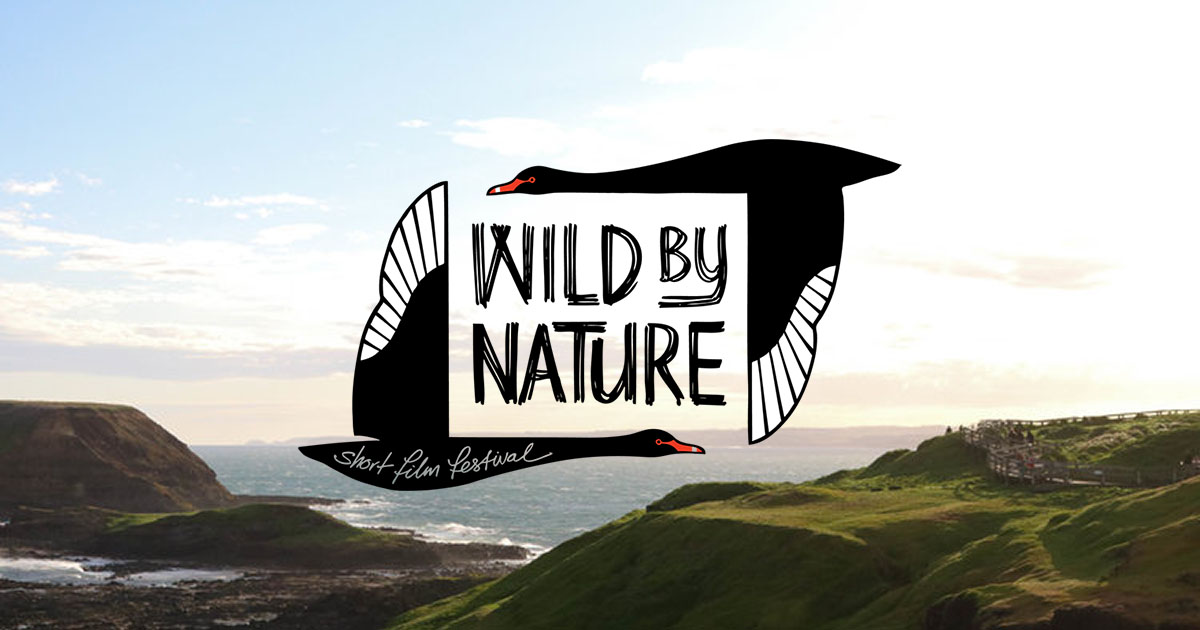
New approaches to climate-proof habitat – 27 November 2020
Posted on 25 November, 2020 by Frances
Our colleagues at Biolinks Alliance are holding their 2020 annual general meeting (AGM) online with an opportunity to hear from local ecologist Paul Foreman presenting on ‘New approaches to climate-proof habitat‘.
Paul will speak about an exciting ecological restoration project being developed by the Alliance with the Taungurung people, Parks Victoria and the Heathcote community, the Spring Plains Watershed Repair project. The project integrates a range of restoration techniques that, at least in central Victoria, have never before been combined at a landscape–scale to demonstrate how the health of bushland damaged by gold mining and timber cutting (among other things) can be quickly and cost effectively restored.
Biolinks Alliance AGM 2020
When: Friday 27 November 2020 at 3.00-4.30 pm.
Location: online. For the meeting agenda, documents and zoom link – click here
For more information or to RSVP: contact Peter Evans at Biolinks Alliance (Peter@biolinksalliance.org.au).
We understand the business side of the AGM will be brief. The occasion is a chance to hear about a new project that has potential to be adapted, amplified and repeated in watersheds – large and small – throughout the region.
Bird of the month: Grey Shrike-thrush
Posted on 23 November, 2020 by Ivan
Welcome to our ninth Bird of the month, a partnership between Connecting Country and BirdLife Castlemaine District. Each month we’re taking a close look at one special local bird species. We’re excited to join forces to deliver you a different bird each month, seasonally adjusted, and welcome suggestions from the community. We are lucky to have the talented and charismatic Jane Rusden from BirdLife Castlemaine District writing about our next bird of the month, with assistance from the brilliant Damian Kelly.
Grey Shrike-thrush (Colluricincla harmonica)
The local bush has been bustling with nesting activity, although raising chicks is not always as nurturing and wholesome as you might think. Nests get raided, eggs don’t always hatch and it’s not necessarily easy for the newly fledged chicks. You’ll hear their incessant begging for food and see parents desperately trying to keep up the flow of breakfast, lunch and dinner. It’s a time of learning as fledglings can’t always assess risks and can be a bit ‘young and dumb’, being too bold for their own good and getting confused as they try to make sense of a situation. I witnessed one such occasion during an altercation in my backyard.

Confused young Grey Shrike-thrush getting harried by an angry Fuscous Honeyeater (photo: Damian Kelly)
A newly fledged Grey Shrike-thrush chick had got too close to a Fuscous Honeyeater nest. The poor chick seemed totally confused about the whole situation and didn’t know which way to go. It’s parents waiting just out of harrying range whilst the Fuscous Honeyeaters were on attack level – ‘take no prisoners’! The upshot was the chick finally moved away, the honeyeaters settled down and I got some photos of the action as they were all preoccupied with bird world high stakes politics.
So let’s look at the abundant Grey Shrike-thrush. Probably one of the most familiar, varied and prettiest of songsters to be heard, which perhaps makes up for its brown and grey colouring. I call it soft and subdued but others may call it out as dull. In the past it was known as the Harmonious Thrush and its taxonomic name reflects this: Colluricincla harmonica. Interestingly, their song can exhibit different dialects from place to place.
Individuals can live up to twelve years and it’s known that pairs can reside in one place for up to five years and remain together for longer. They are largely a sedentary species, but may move between altitudes with the seasons.
Taking a really close look will reveal gorgeous black eyelash like bristles around its bill and below the eye. (Lady Gaga attempted a similar look without the nuance. Pretty rad all the same.)
Present in all but Australia’s driest deserts, it prefers undisturbed treed habitats, including gardens on occasion. It’s often seen foraging for insects and small vertebrates like frogs and lizards, where there is some understorey, tossing leaf litter to find their prey. They will also take eggs and nestlings of small birds, so it’s not surprising the Fuscous Honeyeater was so upset.
To listen to the Grey Shrike-thrush call – click here
A big thank you to contributors to this edition of Bird of the Month – Jane Rusden and Damian Kelly – for their amazing knowledge and skills.
Revegetation and monitoring for success webinar – 25 November 2020
Posted on 23 November, 2020 by Jacqui

Here’s an opportunity that may be of interest to our readers wanting to learn about the latest science on the benefits of revegetation and monitoring. Check out this short webinar hosted by Department of Environment Land Water and Planning (DELWP) through the Arthur Rylah Institute, in collaboration with La Trobe University. The webinar will cover the latest advice for land managers and community groups on how to conduct successful revegetation and how to monitor the outcomes.
Revegetation for Biodiversity: monitoring for success
Hear from experts at La Trobe University in collaboration with the Arthur Rylah Institute for Environmental Research (DELWP) about:
- The latest research on the value of revegetation: how it changes over time, and how it can be undertaken to have the greatest value for biodiversity.
- A standard monitoring protocol designed for land managers and community groups to help assess revegetation outcomes across Victoria.
This webinar is for all audiences and will have a land management focus.
Date: Wednesday 25 November 2020
Time: 1.00 – 2.00 pm
Location: online
To register and for more information: click here
The beautiful and mostly misunderstood snake
Posted on 19 November, 2020 by Ivan
There has been plenty of recent sightings of various beautiful snakes in our region. In fact, there are almost daily appearances at this time of year on our social media platforms and chat pages with many central Victorian locals posting images of snakes spotted in their yards or nearby.
It has been a perfect year for snakes in central Victoria. Late summer rains, autumn growth and a perfect spring break has lead to a healthy population of mice, frogs, lizards, and other tasty treats for snakes. Snakes have emerged as the weather warms up and are now in power-up mode for summer and the mating season. They are more common around our urban fringes and rural areas, owing to an abundance of food (e.g. mice are a favoured food source for Eastern Brown Snakes) or water sources (e.g. Tiger snakes prefer wetlands and creeks). The most common snakes around the Castlemaine region and are Eastern Brown, Tiger, Red-bellied Black, and Copperhead. For a full list, and photos and descriptions of each snake, please click here. For information about snakes locally, and how to be snake-safe on your property and see notes from our snake workshop.
Our partners at Friends of the Box-Ironbark Forests (FOBIF) have recently published an article on a snake sighting around the Castlemaine region, and how to live with snakes. We have shared it below, and a nice photograph that was submitted with the article. Please enjoy, courtesy of FOBIF.
A bit of care, and everyone wins.
They’re out: snakes, we mean.
Which means: look out. It’s important to be careful when in areas likely to be frequented by snakes, for obvious reasons. This is virtually an annual preoccupation, so, at the risk of repeating ourselves, we are now going to repeat ourselves.
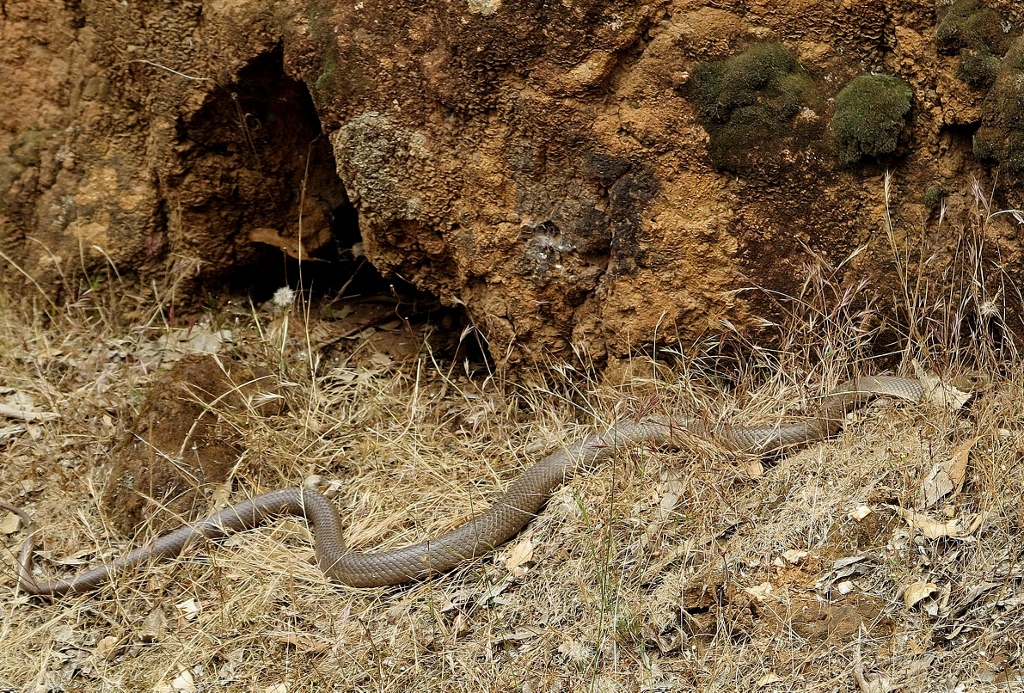
Eastern Brown snake, Gough’s Range SF, November 12 2020: we need to be careful about snakes, but the brute fact is that they are more at risk from us than the other way around.
And here is another great FOBIF snake post from 2014:
‘The Eastern Brown is highly venomous—but it’s not keen on attacking anyone as big as a human, and … will always try to get away if it can. If cornered, however, it is extremely nervous and aggressive. The moral therefore is, don’t approach any snake, and dress appropriately if going into areas where one might be met. The great majority of snakebite deaths have arisen when people unwisely take on the reptile [if you want to get it away from the house, call a snake catcher]. It is, of course, illegal to kill snakes, which are protected animals. For pets, the best advice is, don’t let them roam around the bush ferreting into holes; in any case, dogs should be on a leash in the Diggings Park.
Common sense is the best defence against snake bite, but unfortunately, hysteria is more common than common sense, as witness a 2013 Sydney Telegraph headline: ‘Snakes are raiding the suburbs…Fatal snake bites will become a tragedy repeated this summer as the deadly reptiles—thriving in hot conditions—slither towards the urban sprawl.’ This horror movie scenario doesn’t fit well with the fact that on average less than 3 people per year over the whole of Australia die from snakebite: far more people are killed by bee stings…
…And the odds are stacked against the snake: more than five million reptiles are killed by cars in Australia every year. According to the Australian Museum, ‘countless’ Brown snakes perish in this way, ‘both accidentally and on purpose’.
For other FOBIF material on the subject of snakes, click here and here.
Now is the time to find needle grasses & volunteer opportunity in Castlemaine!
Posted on 19 November, 2020 by Ivan
Needle grasses, and in particular, Chilean Needle Grass (Nassella neesiana), are now in full seed and are becoming a serious pasture and environmental weed in our region. They are very invasive and form dense infestations in pastures, bushland and roadsides. They can tolerate drought and will seed prolifically, including self-pollinated seed in the stem and base of the plant, giving them great potential to spread and over-run existing vegetation. It has been estimated that the potential distribution for Chilean Needle Grass alone exceeds 40 million hectares across Australia.
One of the biggest challenges facing the successful treatment of needle grasses is identifying infestations before they become large and dominating in the landscape. Thankfully, a local community champion recently produced an information sheet on how to differentiate invasive needle and native grasses, titled ‘Distinguishing between needle grasses and native grasses‘. The information sheet has useful photographs and identifying features of needle grasses, and compares these features to a variety of native grasses including spear grasses (Austrostipa species), wallaby grasses (Rytidosperma species) and native tussock grass (Poa labillardieri). Non-native grasses covered include Chilean, Texas and Cane Needle Grass (all members of Nassella genus), and the closely related Espartillo (Amelichloa caudata).

Landowners learning the finer points of needle grass identification at a field day. Photo Connecting Country
Please watch this video on how to identify Chilean Needle Grass, it is from New Zealand but highlights the important points of identifying this invasive grass. Click here
Another helpful information sheet, ‘What to do if you find needle grass’ details first-hand experience of how best to manage these grassy weeds and prevent further spread.
Volunteer opportunity in Castlemaine!
If you would to learn more about Needle Grasses and would like to attend a working bee please contact Margaret Panter on 5470 5072 (7am-7pm). Margaret is holding a socially-distanced working bee in the Castlemaine Botanic Gardens in the next few days, and as needed in the next couple of months. No experience necessary, and volunteers can attend as their availability allows.
Weed management after fire webinar series starts 25 November 2020
Posted on 19 November, 2020 by Jacqui

Jump on and register for this opportunity to learn all about weed management after bushfire, delivered by the Weeds at Early Stages of Invasion (WESI) team and a wealth of expert collaborators. There are four free webinars in total, with each delivering a wealth of knowledge and useful information. It is vital to get on top of weeds after fire, as they usually are the first plants to immerge and have a blank canvas to invade and dominate in the years to come.
Weed management after fire webinar series
After bushfire, our ecosystems are at their most vulnerable to weed invasion. Help us support indigenous flora and fauna by managing weeds in bushfire affected areas.
This webinar* series focuses on sharing practical knowledge so everyone can contribute to bushfire recovery.
Time:
Four webinars on the below dates all from 10:30 am to 12:15 pm.
Dates:
Webinar 1: Wednesday 25 November 2020 – Overview weed management after fire.
Webinar 2: Wednesday 2 December 2020 – Prioritisation of weeds after fire.
Webinar 3: Wednesday 9 December 2020 – Collaborative projects – weed management after fire.
Webinar 4: Wednesday 16 December 2020 – Weed identification and recording after fire.
For more information and to register for these free webinars: CLICK HERE
Collaborators:
- State Wide Integrated Flora and Fauna Teams (SWIFFT)
- Department of Environment, Land, Water and Planning (DELWP) including:
- Weeds at the Early Stage of Invasion (WESI)
- Bushfire Biodiversity Response and Recovery (BBRR)
- Natural Environment Program (NEP)
- Connecting Communities Program (CCP)
- Weeds and Pests on Public Land (WPPL)
- Parks Victoria
- East Gippsland Catchment Management Authority (EGCMA)
- Weed Society of Victoria (WSV)
- Gunaikurnai Land and Waters Aboriginal Corporation (GLaWAC)
- Landcare Victoria
- Trust for Nature
- Regional Roads Victoria
- Department of Jobs, Precincts and Regions (DJPR)
- Australian Association of Bush Regenerators (AABR)
- Foundation for National Parks & Wildlife (FNPW)
* These webinars are funded by the Victorian Government’s $22.5 million Bushfire Biodiversity Response and Recovery program. For more information on the BBRR program, visit www.wildlife.vic.gov.au/home/biodiversity-bushfire-response-and-recovery
How to build a microbat box
Posted on 12 November, 2020 by Frances
Since beginning our nest box program back in 2010, Connecting Country has installed over 450 boxes on private and public land across the Mount Alexander region. The nest boxes were designed specifically for use by the threatened Brush-tailed Phascogale (also known as the Tuan), which is a nocturnal hollow-dependent marsupial native to our area.
The nest boxes provide supplementary habitat for the Tuans and other native animals such as the Sugar Glider. It is anticipated that providing additional nesting sites, albeit artificial, will lead to an increase in local Tuan populations and distribution. The nest boxes were located across the landscape systematically so we can examine some of the factors that influence their use.
We recently discovered a great article from the creative folk at Milkwood regarding how to build a microbat box, which is similar to a nestbox. Milkwood point out that ‘Microbats are worth encouraging into your garden. Not only are they delightful to watch on dusk – they gobble thousands of mosquitoes, moths and other garden pests each and every night. A single microbat can eat up to 1,200 mosquitoes and small insects in an hour – which has earned them the well-deserved reputation of being nature’s mosquito busters.’
To enjoy the full article on Milkwood’s website – click here
For more information on Connecting Country’s nest box program – click here
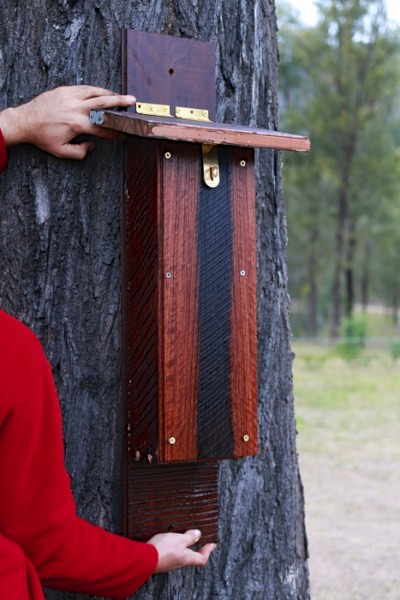
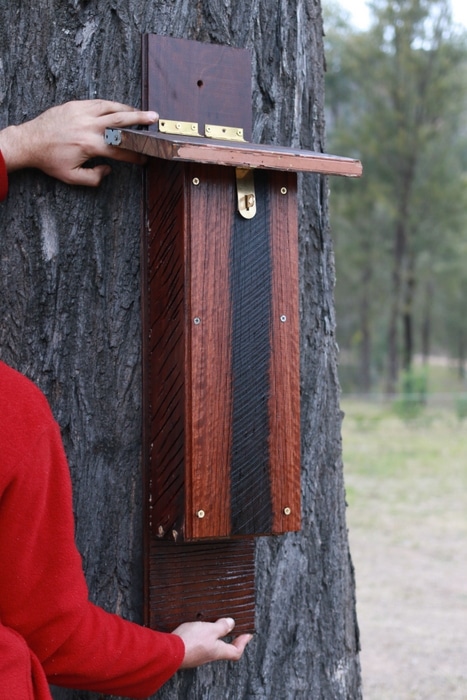
Mount your bat box on a tree, pole or building – high enough to prevent vandalism and protect the bats from predators and floods (photo: Milkwood)


NAIDOC Week 2020
Posted on 12 November, 2020 by Ivan
Always was, Always will be is the designated theme for NAIDOC Week 2020, which is being celebrated across the country from 8-11 November 2020. The acronym NAIDOC stands for National Aborigines and Islanders Day Observance Committee. Each year, NAIDOC Week gives our community the opportunity to celebrate and acknowledge the history, culture and achievements of Aboriginal and Torres Strait Islanders. This year’s theme reminds us that Aboriginal and Torres Strait Islander people have occupied and cared for this land for over 65,000 years, and that their cultures have been recognised as the oldest living cultures in the world.
On a local level, this week presents the opportunity for the community to delve into the history and connections to the land of Indigenous Australians. In our part of Central Victoria, the land we stand upon is that of the Dja Dja Wurrung Nation, who had practised their sustainable land management practices for many centuries. For more information about the Dja Dja Wurrung clan, and their history, cultural practices, current projects and media – click here.
It has been exciting to see the Dja Dja Wurrung Clans Aboriginal Corporation working in partnership with local interest groups, adjoining residents, Djarra community members, and state and local government agencies, to further connect people with nature and protect and improve biodiversity at two key sites:
- Kalimna Park within Castlemaine Diggings National Heritage Park.
- Wildflower Drive area of Greater Bendigo National Park.
For more information about NAIDOC week, and all the events across our many nations, please click on the image below.





